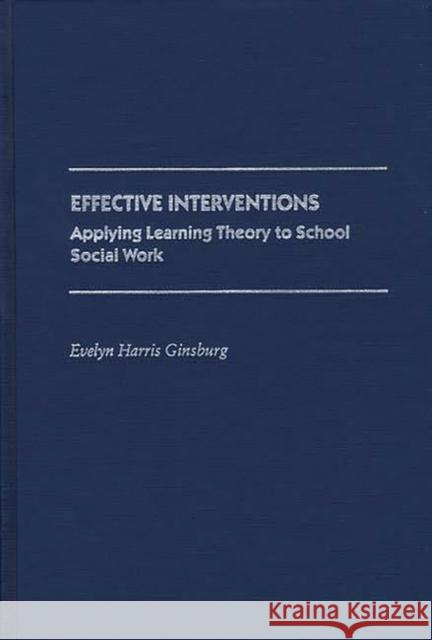Effective Interventions: Applying Learning Theory to School Social Work » książka
Effective Interventions: Applying Learning Theory to School Social Work
ISBN-13: 9780313267680 / Angielski / Twarda / 1990 / 232 str.
This groundbreaking volume is written for therapists, school social workers, educational practitioners, and others who wish to provide psychological treatment to children from within the school environment. Evelyn Harris Ginsburg details the day-to-day functions and concerns of the school social worker, offering appropriate interventions that school social workers, no matter what their level of experience with applied behavior analysis, student social workers, and other school personnel can use to assist pupils. This study provides reports of empirically validated procedures--interventions that work--and the study serves as a needed working tool for those involved with the lives of children, to help them overcome a range of difficulties and to enhance their academic achievement. And, most of the procedures can be used not only by school personnel but also by the children themselves, family members, or friends working under the guidance of school social workers. The text, written in the language of learning theory, underlines the importance of environment in determining adjustment and advocates teamwork in schools and cooperation among those who deal with children in other settings.
Divided into three major sections, the volume begins with an introduction that provides a compelling rationale for behavior analysis in school social work. It also presents a history of behavioral analysis in schools and in social work and analyzes the current relation of the two. The central section is devoted to an explication of when to use behavior analysis that focuses on behavior problems related to school, home behavior problems related to school, and problems in the local community that effect school behavior. The final section addresses the components of the method, detailing useful interventions, parent training, and school related settings that favor behavior analysis. The valuable appendix offers a summary of the daily concerns of the behavioral school social worker, while an exhaustive bibliography as well as subject and author indexes complete the volume. Effective Interventions embodies a challenge to use the environment to improve the functioning of children and offers sound, practice-based strategies for doing so. Highly recommended as a how-to book for school social workers, behavior therapists, and school personnel, the study is also useful as a guide to further research needed in the field and as a text in college-level psychology, education, and social work courses.











